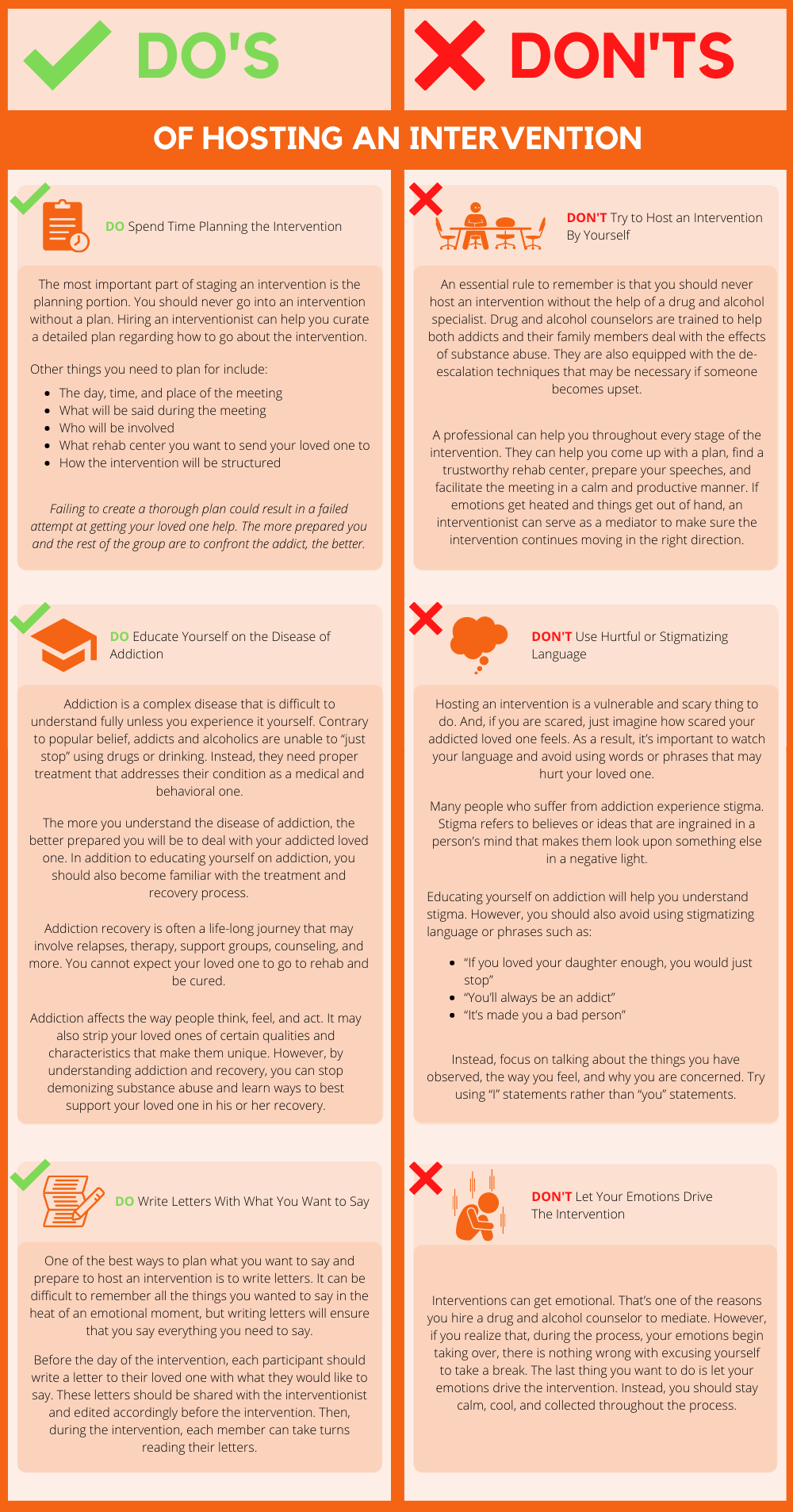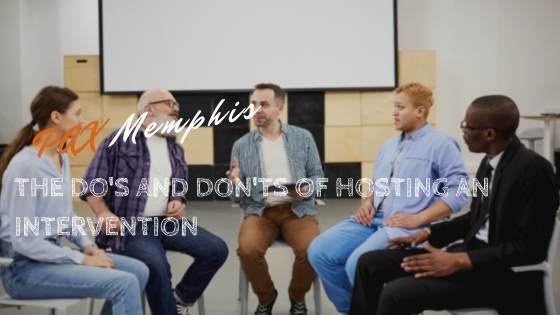Learning the right way to host an intervention can determine the success of said intervention. Interventions are a useful way to confront a loved one about their substance abuse and try to convince them to go to rehab. However, staging an intervention is a delicate process.
Of course, you don’t want to say the wrong thing, but you do want to get your point across and get your loved one into rehab. If you say the wrong thing, fail to prepare, or go into the process blindly, your intervention might fail.
Here are some important do’s and don’ts of staging an intervention that you should keep in mind.

DO Spend Time Planning the Intervention
The most important part of staging an intervention is the planning portion. You should never go into an intervention without a plan. Hiring an interventionist can help you curate a detailed plan regarding how to go about the intervention.
Other things you need to plan for include:
- The day, time, and place of the meeting
- What will be said during the meeting
- Who will be involved
- What rehab center you want to send your loved one to
- How the intervention will be structured
Failing to create a thorough plan could result in a failed attempt at getting your loved one help. The more prepared you and the rest of the group are to confront the addict, the better.
DON’T Try to Host an Intervention By Yourself
An essential rule to remember is that you should never host an intervention without the help of a drug and alcohol specialist. Drug and alcohol counselors are trained to help both addicts and their family members deal with the effects of substance abuse. They are also equipped with the de-escalation techniques that may be necessary if someone becomes upset.
A professional can help you throughout every stage of the intervention. They can help you come up with a plan, find a trustworthy rehab center, prepare your speeches, and facilitate the meeting in a calm and productive manner. If emotions get heated and things get out of hand, an interventionist can serve as a mediator to make sure the intervention continues moving in the right direction.
DO Educate Yourself on the Disease of Addiction
Addiction is a complex disease that is difficult to understand fully unless you experience it yourself. Contrary to popular belief, addicts and alcoholics are unable to “just stop” using drugs or drinking. Instead, they need proper treatment that addresses their condition as a medical and behavioral one.
The more you understand the disease of addiction, the better prepared you will be to deal with your addicted loved one. In addition to educating yourself on addiction, you should also become familiar with the treatment and recovery process.
Addiction recovery is often a life-long journey that may involve relapses, therapy, support groups, counseling, and more. You cannot expect your loved one to go to rehab and be cured. You also can’t expect them to be entirely compliant in going to treatment, either.
Addiction affects the way people think, feel, and act. It may also strip your loved ones of certain qualities and characteristics that make them unique. However, by understanding addiction and recovery, you can stop demonizing substance abuse and learn ways to best support your loved one in his or her recovery.
DON’T Use Hurtful or Stigmatizing Language
Hosting an intervention is a vulnerable and scary thing to do. And, if you are scared, just imagine how scared your addicted loved one feels. As a result, it’s important to watch your language and avoid using words or phrases that may hurt your loved one.
Many people who suffer from addiction experience stigma. Stigma refers to believes or ideas that are ingrained in a person’s mind that makes them look upon something else in a negative light. For example, addiction drives people to do things they would normally not do, like lie, cheat, and steal. These actions make many people believe that addicts are bad people. While addiction may make people do bad things, that is the disease – not the actual person.
Educating yourself on addiction will help you understand stigma. However, you should also avoid using stigmatizing language or phrases such as:
- “If you loved your daughter enough, you would just stop”
- “You’ll always be an addict”
- “It’s made you a bad person”
Instead, focus on talking about the things you have observed, the way you feel, and why you are concerned. Try using “I” statements rather than “you” statements.
DO Write Letters With What You Want to Say
One of the best ways to plan what you want to say and prepare to host an intervention is to write letters. It can be difficult to remember all the things you wanted to say in the heat of an emotional moment, but writing letters will ensure that you say everything you need to say.
Before the day of the intervention, each participant should write a letter to their loved one with what they would like to say. These letters should be shared with the interventionist and edited accordingly before the intervention. Then, during the intervention, each member can take turns reading their letters.
DON’T Let Your Emotions Drive The Intervention
Interventions can get emotional. That’s one of the reasons you hire a drug and alcohol counselor to mediate. However, if you realize that, during the process, your emotions begin taking over, there is nothing wrong with excusing yourself to take a break. The last thing you want to do is let your emotions drive the intervention. Instead, you should stay calm, cool, and collected throughout the process.
Find Help Staging an Intervention Today
There are few circumstances more painful than watching a loved one suffer from addiction. Fortunately, you don’t have to sit back and be powerless.
Medically Reviewed: September 25, 2019

All of the information on this page has been reviewed and verified by a certified addiction professional.










